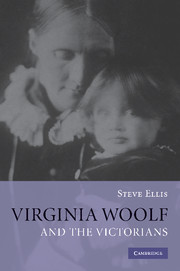Book contents
- Frontmatter
- Contents
- Acknowledgements
- List of editions and abbreviations used in the text
- Indroduction
- Chapter 1 Reclamation: Night and Day
- Chapter 2 Synchronicity: Mrs Dalloway
- Chapter 3 Integration: To the Lighthouse
- Chapter 4 Disillusion: The Years
- Chapter 5 Incoherence: the final works
- Conclusion: reclaiming the shadows
- Notes
- Index
Conclusion: reclaiming the shadows
Published online by Cambridge University Press: 22 September 2009
- Frontmatter
- Contents
- Acknowledgements
- List of editions and abbreviations used in the text
- Indroduction
- Chapter 1 Reclamation: Night and Day
- Chapter 2 Synchronicity: Mrs Dalloway
- Chapter 3 Integration: To the Lighthouse
- Chapter 4 Disillusion: The Years
- Chapter 5 Incoherence: the final works
- Conclusion: reclaiming the shadows
- Notes
- Index
Summary
Woolf's inability to make her picture of the Victorian ‘cohere’ at the end of her life is a final and more intense statement of contradictory responses apparent throughout her life and career. Woolf recognised these contradictions, and even got a certain amount of fun out of them, as in her characteristic device of introducing the term ‘Victorian’ as a kind of shorthand for conclusions that cannot be concluded; see for example the end of ‘A Talk About Memoirs’ (‘He enjoyed life; that's what the Victorians – but, go on – tell me how Orme was poisoned’, Eiii. 184), or Orlando's ‘conclusion’ about Victorian literature (‘which was of the highest importance but which … we must omit’, O, pp. 201–2), or the essay on the ‘genius’ of B. R. Haydon (‘not the Shakespearean but the Victorian genius … not the true, but – let us pause, however …’, Eiv. 406). If Victorian ‘genius’ is never precisely defined in this last essay, it seems to be associated with the extravagance of a passionate temperament or temper, as Woolf later confirmed in relation to Leslie Stephen and the licence ‘the “genius” legend’ seemed to permit him (A Sketch, MOB, pp. 121, 158). One of the paradoxical relations of Victorian culture is precisely that between ‘passion’ and volubility and ‘suppression’ and reserve, which has been touched on previously.
- Type
- Chapter
- Information
- Virginia Woolf and the Victorians , pp. 171 - 180Publisher: Cambridge University PressPrint publication year: 2007



